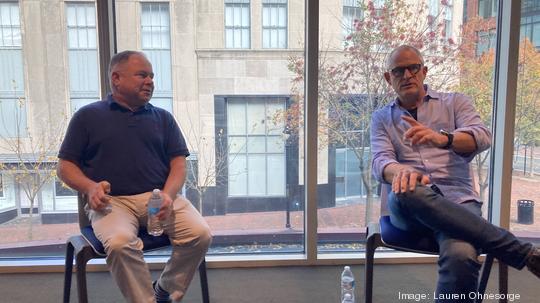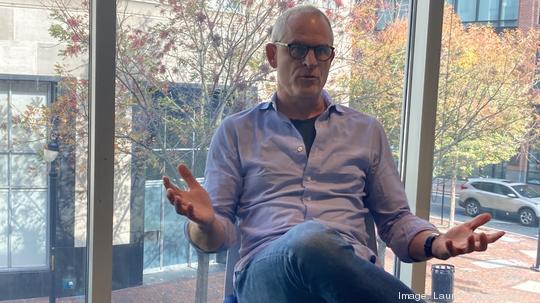
Good venture capital deals are still getting done. But entrepreneurs have to hustle – and filter through more scrutiny as they sell their ideas.
That’s one take from Tige Savage, who cofounded Revolution Ventures in Washington, D.C., alongside former AOL chief Steve Case. Savage was in Durham Monday, scouting for future investments and sharing entrepreneurship tips at a fireside chat-style panel hosted by Bull City Venture Partners’ Jason Caplain at American Underground.
“The volume of deals may be getting smaller but good deals are getting financed,” Savage said. The standards for the industry have just gotten higher, he said. And while that “might be a little painful for entrepreneurs,” it’s also healthy, he said.
“I really think that times when the markets are tougher are when some of the very best companies get created," he said.
At Revolution, the pandemic meant more in-depth due diligence. For the first time, the firm was making investments in companies without meeting founders in person – a prospect that “was really hard for us to get our heads around,” he said.
“We didn’t like that,” he said.

So to compensate, Revolution upped its due diligence – specifically its reference checks. It went from a typical references list to “find everybody you know who knows somebody who knows somebody who knows something,” he said.
And, while the team is meeting founders in person again, the extra focus on a company’s references stuck post-pandemic.
“The market, in general, is doing more diligence on opportunities,” he said.
His advice for companies preparing for that kind of scrutiny? “Try to be buttoned up,” he said.
“You don’t have to have all the answers,” he said. “But you have to have thought through all of the things that lead to what you think the right answer is. … Do more work up front than you expect to.”
At Revolution, its firms are asked to “get a real accounting firm,” as it insists on brand names. It does “real audits,” and usually includes these types of requirements in its term sheets for major investments.
Revolution is not just offering dollars, Savage said. Revolution is an “involved” investor, he said. It makes introductions to potential partners, additional capital sources.
Revolution has made a name for itself with a strategy that Case has described as the “rise of the rest.” While many of its traditional VC counterparts focus on longtime entrepreneurial powerhouse Silicon Valley, Revolution focuses on the “rest” of the country – and that includes the “Raleighs and the Durhams,” Savage said.
“We took a look to see where we felt like we had the most compelling companies,” Savage told the crowd gathered at AU Monday afternoon. “Those weren’t those markets that were more competitive for us, they were in markets like this.”
Revolution has three fund buckets – a seed fund, passive investments in rounds led by others – think between $50,000 and $150,0000 typically; venture financing, largely Series A rounds, where it likes to lead and secure a board seat, investing between $1 million and $10 million; and growth financing, typically between $25 million and $50 million.
As a “generalist” firm, Revolution invests across the spectrum, from consumer firms to B2B, though it tends to avoid heavily regulated arenas such as health care. It’s unusual for Revolution to make a Series A investment in a pre-revenue company.
Revolution looks for traction – and product market fit is a big part of the equation. That can mean revenue, but it can also mean exhibiting signs that “customers are showing up in an unforced, scaleable way.”
“They’re getting traction, that it’s clear that customers want to buy this stuff, that’s more important to us than how much have the customers bought,” he said.